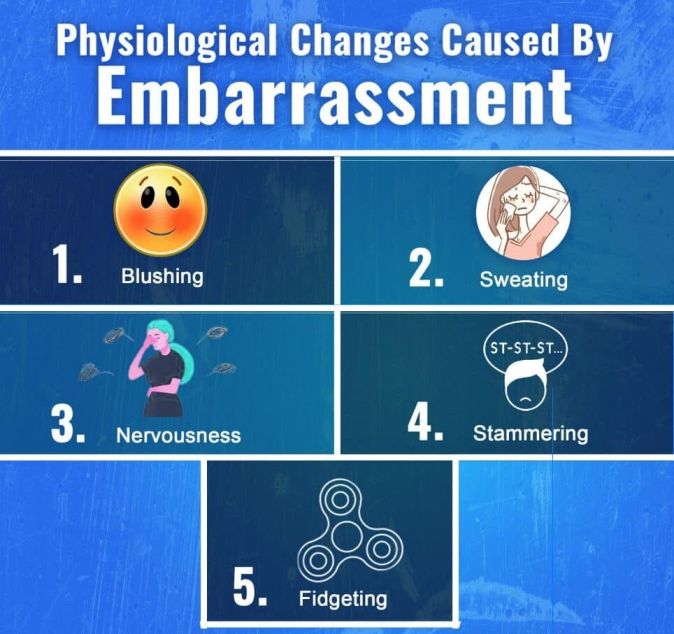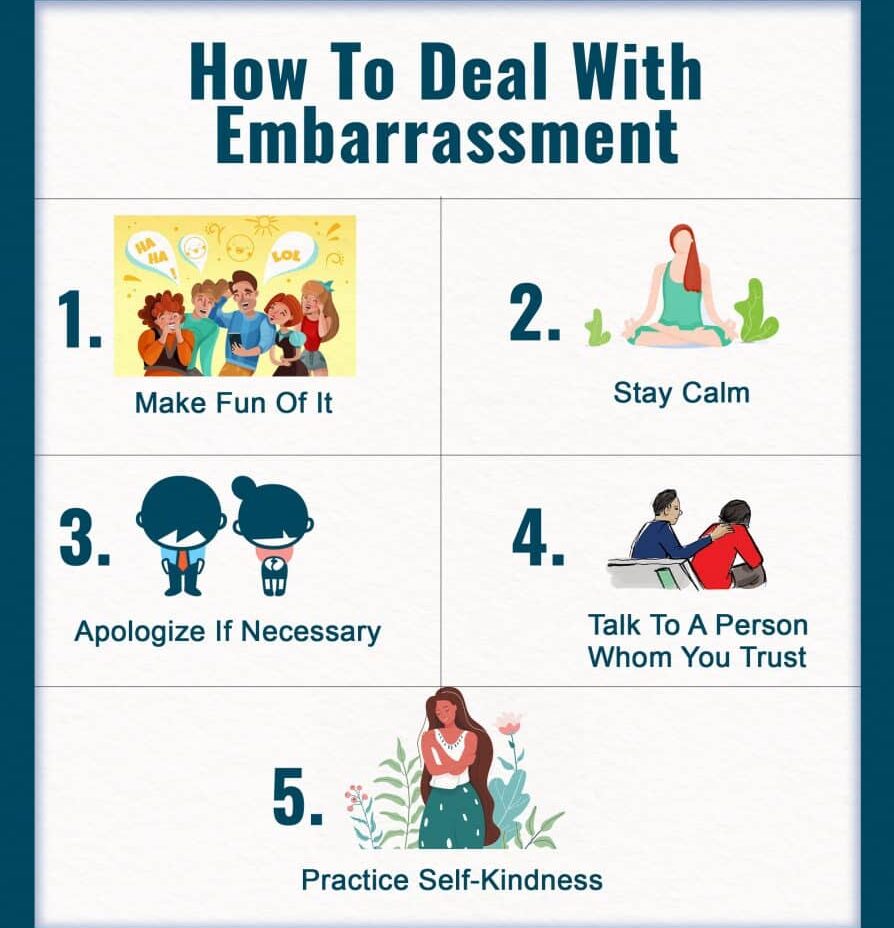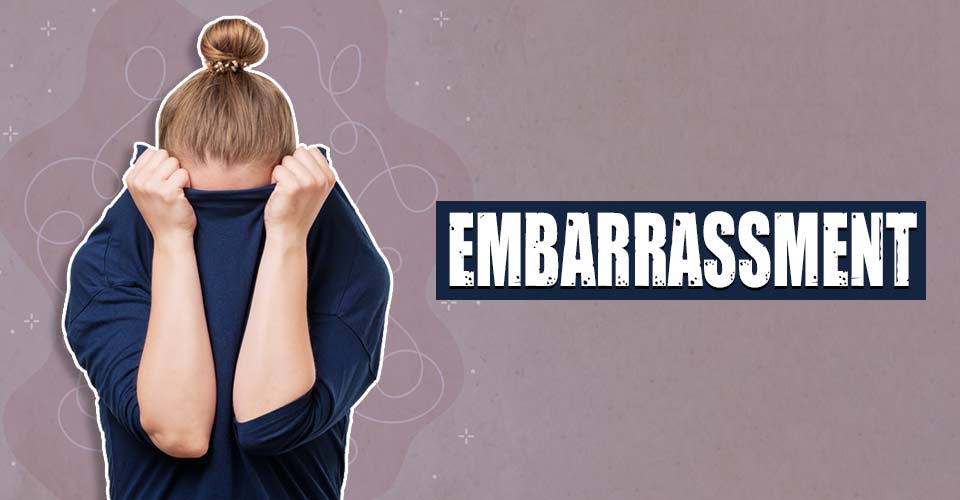Embarrassment is an uncomfortable emotional state that people experience when they have done or witnessed a socially or professionally unacceptable act or condition. It is considered a self-conscious emotion.
What Is An Embarrassment?
Embarrassment refers to an important social but painful emotion that we feel when we have committed a mistake or behaved against social norms and standards. One can also feel embarrassed after witnessing a violation of social norms which is appraised by others. Though it is universal in human social life, the feeling of being embarrassed is an upsetting experience itself. A 2015 study 1 Krishna, A., Herd, K. B., & Aydınoğlu, N. Z. (2015). Wetting the bed at twenty‐one: Embarrassment as a private emotion. Journal of Consumer Psychology, 25(3), 473-486. https://doi.org/10.1016/j.jcps.2015.02.005 explains that “One can feel embarrassed when one violates a social norm in private, or when one appraises oneself and violates one’s self-concept.”. One can feel weird, nervous, worried, stupid, ugly, or worthless during such situations. In certain instances, other’s actions or behavior can also embarrass a person.
This emotional state is associated with mild to severe levels of discomfort. It acts as a form of internal feedback as it makes people feel bad or ashamed about their personal or social wrongdoings so that they don’t repeat the same error further. The feeling can be personal and triggered by unwanted attention to private matters or any kind of personal flaws or shyness.A 1997 research paper 2 Keltner, D., & Buswell, B. N. (1997). Embarrassment: its distinct form and appeasement functions. Psychological bulletin, 122(3), 250–270. https://doi.org/10.1037/0033-2909.122.3.250 suggests four significant causes of someone being embarrassed, such as:
- Loss of self-esteem
- Concern for others’ evaluation
- absence of scripts to guide interactions
- A desire to correct preceding transgressions
A 2011 research 3 Tangney, J. P., Stuewig, J., & Mashek, D. J. (2007). Moral emotions and moral behavior. Annual review of psychology, 58, 345–372. https://doi.org/10.1146/annurev.psych.56.091103.070145 describes embarrassment as a self-conscious emotion that is mostly evoked by self-reflection and self-evaluation. The self-conscious feeling involves some amount of morality and loss of honor or dignity, although the type largely depends on the embarrassing situation. Some people may experience it just like any other passing feeling, while others may experience it as an overwhelming feeling that is extremely hard to cope with.
At first, it may seem like a permanent emotion, but it doesn’t last forever and eventually fades as people start to understand the situation better. Studies 4 National Collaborating Centre for Mental Health (UK). Social Anxiety Disorder: Recognition, Assessment and Treatment. Leicester (UK): British Psychological Society; 2013. (NICE Clinical Guidelines, No. 159.) 2, SOCIAL ANXIETY DISORDER. Available from: https://www.ncbi.nlm.nih.gov/books/NBK327674/ have shown that it can develop from both positive and negative incidents and cause significant psychological problems, including anxiety, panic disorder, stress, and depression. This emotional state causes certain physiological changes:

- Blushing
- Sweating
- Nervousness
- Stammering
- Fidgeting
Understanding Embarrassment
It is a sense of internal discomfort and a highly individual experience. People can be embarrassed in different types of situations. The feeling of being embarrassed is often considered as an accidental failure to meet the accepted social standards. A 2017 research paper 5 Dolezal, L., & Lyons, B. (2017). Health-related shame: an affective determinant of health?. Medical humanities, 43(4), 257–263. https://doi.org/10.1136/medhum-2017-011186 suggests that this self-conscious feeling can have an adverse effect on an individual’s behavior and thoughts that often lead to negative evaluation.
A person may become extremely conscious of certain real or imagined failures to maintain social norms. Apart from feeling embarrassed, it can make a person experience awkwardness, shame, guilt, exposure, or regret. Studies 6 Müller-Pinzler, L., Gazzola, V., Keysers, C., Sommer, J., Jansen, A., Frässle, S., Einhäuser, W., Paulus, F. M., & Krach, S. (2015). Neural pathways of embarrassment and their modulation by social anxiety. NeuroImage, 119, 252–261. https://doi.org/10.1016/j.neuroimage.2015.06.036 have found that the feeling of being embarrassed is associated with certain activities in the ventrolateral prefrontal cortex and amygdala. Though it is typically experienced as a negative feeling, a 2012 study 7 Feinberg, M., Willer, R., & Keltner, D. (2012). Flustered and faithful: embarrassment as a signal of prosociality. Journal of personality and social psychology, 102(1), 81–97. https://doi.org/10.1037/a0025403 claims that potential embarrassment prepares us for certain human characteristics, such as:
- Individuals who are capable of accepting their faults and mistakes tend to be most trustworthy.
- The anticipation prepares us for challenging situations.
- It helps to maintain social orders in a healthy way.
According to a 2004 research 8 Moore, R., Brødsgaard, I., & Rosenberg, N. (2004). The contribution of embarrassment to phobic dental anxiety: a qualitative research study. BMC psychiatry, 4, 10. https://doi.org/10.1186/1471-244X-4-10 , it is often intensified by the fear that everyone is judging when mostly no one will ever notice. It is frequently confused with shame and guilt as these emotions are all self-conscious. Research 9 Tangney, J. P., Miller, R. S., Flicker, L., & Barlow, D. H. (1996). Are shame, guilt, and embarrassment distinct emotions?. Journal of personality and social psychology, 70(6), 1256–1269. https://doi.org/10.1037//0022-3514.70.6.1256 says that embarrassment, guilt, and shame are quite similar emotions that cause similar affective experiences. But shame is a more intense feeling and often linked with moral issues. Meanwhile, the feelings of being embarrassed fade away more easily than shame.
Functions Of Embarrassment
The following are three basic functions that the feeling of embarrassment serves:
1. Polite gesture
A 2012 study 10 Feinberg, M., Willer, R., & Keltner, D. (2012). Flustered and faithful: embarrassment as a signal of prosociality. Journal of personality and social psychology, 102(1), 81–97. https://doi.org/10.1037/a0025403 explains that it serves as an appeasement or polite gesture to other people by explaining that the violation of the social rule or norm was unintended. It also claims that the violation will not be repeated.
2. Social counterpart
It plays the role of a social counterpart to physical pain. Studies 11 Leary M. R. (2015). Emotional responses to interpersonal rejection. Dialogues in clinical neuroscience, 17(4), 435–441. https://doi.org/10.31887/DCNS.2015.17.4/mleary have shown that the intense fear of being embarrassed discourages us from repeating whatever behavior triggered that emotional state. As any kind of physical pain alerts us to threats to our physical well-being, this self-consciousness alerts us to threats to our psychological and social well-being.
3. Damage controller
According to a 2014 research paper 12 Lickel, B., Kushlev, K., Savalei, V., Matta, S., & Schmader, T. (2014). Shame and the motivation to change the self. Emotion (Washington, D.C.), 14(6), 1049–1061. https://doi.org/10.1037/a0038235 , it acts as a damage controller as it motivates us to undo the error or social damage and develops a desire for self-change. It also influences people to restore the esteem of others.
What Triggers Embarrassment
While exploring the nature of human emotions, several psychologists and researchers have argued about what triggers such emotions. Most of the time they have found that human emotions are not triggered by any kind of event. A 2017 research paper 13 Jamieson, J. P., Hangen, E. J., Lee, H. Y., & Yeager, D. S. (2018). Capitalizing on Appraisal Processes to Improve Affective Responses to Social Stress. Emotion review : journal of the International Society for Research on Emotion, 10(1), 30–39. suggests that cognitive appraisal plays the active role of a trigger in such instances. Cognitive appraisal refers to a person’s interpretation of the stimuli in their current environment.
Embarrassment is often triggered by such subjective interpretations. This theory of cognitive appraisal 14 Miller, R.S. (1995), On the Nature of Embarrassabllity: Shyness, Social Evaluation, and Social Skill. Journal of Personality, 63: 315-339. https://doi.org/10.1111/j.1467-6494.1995.tb00812.x explains that being embarrassed originates from the anticipation of negative evaluation by others. People become embarrassed when they assume that the social image they want to project has been sabotaged. People experience embarrassment when they perceive that others are forming negative impressions of them.
Situations Where You Can Feel Embarrassed
There are certain situations where you can feel embarrassed. The amount or severity of this emotional state largely depends upon the particular situation or event. The situations are:
- Talking or having a conversation about sexual activity
- Talking about financial problems that you are experiencing
- Getting attention for your success or achievements
- Your family’s behavior, traditions, or cultures
- Feeling uncomfortable due to your physical appearance or low self-esteem
- Being made to attempt something due to peer pressure
- Experiencing abuse or assault even though you are not at fault
- Meeting new people or communicating with them for the first time
Embarrassment And Mental Health
Even a small embarrassing event can diminish someone’s self-worth and confidence. Most people who experience public humiliation ruminate the event over and over that triggers a renewed sense of being embarrassed each time. A 2009 research 15 Zetsche, U., Ehring, T., & Ehlers, A. (2009). The effects of rumination on mood and intrusive memories after exposure to traumatic material: An experimental study. Journal of behavior therapy and experimental psychiatry, 40(4), 499–514. https://doi.org/10.1016/j.jbtep.2009.07.001 suggests that an over-exaggeration and repeated rumination of the event develops a sense of humiliation that may also lead to feeling embarrassed.
According to a 2013 study 16 Leask P. (2013). Losing trust in the world: Humiliation and its consequences. Psychodynamic practice, 19(2), 129–142. https://doi.org/10.1080/14753634.2013.778485 , a significant event or repeated humiliation often leads to certain health concerns, including anxiety, stress, and depression. As the repeated events of humiliation cause chronic negative thought patterns and a lowered sense of self-worth, the developed sense of shame and guilt may potentially lead to certain other health problems such as:
- Eating disorder 17 Troop, N. A., Allan, S., Serpell, L., & Treasure, J. L. (2008). Shame in women with a history of eating disorders. European eating disorders review : the journal of the Eating Disorders Association, 16(6), 480–488. https://doi.org/10.1002/erv.858
- Social isolation 18 Yanguas, J., Pinazo-Henandis, S., & Tarazona-Santabalbina, F. J. (2018). The complexity of loneliness. Acta bio-medica : Atenei Parmensis, 89(2), 302–314. https://doi.org/10.23750/abm.v89i2.7404
- Self-harming tendency 19 Hack, J., & Martin, G. (2018). Expressed Emotion, Shame, and Non-Suicidal Self-Injury. International journal of environmental research and public health, 15(5), 890. https://doi.org/10.3390/ijerph15050890
- Suicidal thoughts 20 Pia, T., Galynker, I., Schuck, A., Sinclair, C., Ying, G., & Calati, R. (2020). Perfectionism and Prospective Near-Term Suicidal Thoughts and Behaviors: The Mediation of Fear of Humiliation and Suicide Crisis Syndrome. International journal of environmental research and public health, 17(4), 1424. https://doi.org/10.3390/ijerph17041424
Another kind of embarrassment occurs when a sufferer with a psychological condition or their family members feel embarrassed because of their mental illness. Those with mental health concerns are mostly stigmatized as violent, dangerous, and incapable of self-care. The feeling of being embarrassed mostly stems from such beliefs. Research 21 Ahmedani, B. K., Kubiak, S. P., Kessler, R. C., de Graaf, R., Alonso, J., Bruffaerts, R., Zarkov, Z., Viana, M. C., Huang, Y. Q., Hu, C., Posada-Villa, J. A., Lepine, J. P., Angermeyer, M. C., de Girolamo, G., Karam, A. N., Medina-Mora, M. E., Gureje, O., Ferry, F., Sagar, R., & Anthony, J. C. (2013). Embarrassment when illness strikes a close relative: a World Mental Health Survey Consortium Multi-Site Study. Psychological medicine, 43(10), 2191–2202. https://doi.org/10.1017/S003329171200298X says that family members of a mentally unstable person tend to feel more embarrassed due to the person’s mental condition rather than being concerned about the person’s physical well-being. However, social support for people with mental health concerns is extremely crucial for their recovery process as embarrassment can easily create barriers 22 Salaheddin, K., & Mason, B. (2016). Identifying barriers to mental health help-seeking among young adults in the UK: a cross-sectional survey. The British journal of general practice : the journal of the Royal College of General Practitioners, 66(651), e686–e692. https://doi.org/10.3399/bjgp16X687313 in mental health treatment.
Read More About Eating Disorders Here
How To Deal With Embarrassment

Many people can overcome this unpleasant emotion with some dedication, practice and effort. Meanwhile, emotionally sensitive people may ruminate about the event and feel a renewed sense of humiliation every time. Thus, it is very important for an individual to know how to deal with the emotional state. Here are some beneficial ways that can help you deal with embarrassment effectively:
1. Make fun of it
The best strategy is to confront or face the situation and one can do it effectively by using humor. A 2016 research 23 Louie, D., Brook, K., & Frates, E. (2016). The Laughter Prescription: A Tool for Lifestyle Medicine. American journal of lifestyle medicine, 10(4), 262–267. https://doi.org/10.1177/1559827614550279 claims that evoked laughter or making jokes can instantly reduce the seriousness or tension of the situation. It also makes people look confident and courageous.
2. Stay calm
It is important to keep calm and stay cool in that situation. Several studies 24 Barbosa Escobar, F., Velasco, C., Motoki, K., Byrne, D. V., & Wang, Q. J. (2021). The temperature of emotions. PloS one, 16(6), e0252408. https://doi.org/10.1371/journal.pone.0252408 show that emotions and temperature are interlinked with each other. If you are feeling guilt, shame, or regret, drink a glass of water as it will help you control angry outbursts.
3. Apologize if necessary
If you feel that your behavior or action might have upset someone, it is extremely important to apologize to them. An apology has the power to end conflicts and disagreements between people. Admitting your faults or errors helps you to take responsibility and learn from your mistakes.
4. Practice self-kindness
If you find yourself embarrassed more often, try to avoid such moments and situations. Remember to breathe when they occur. Try to laugh it out or communicate simply.
5. Talk to a person whom you trust
Discussing or having a non-judgemental conversation often makes things clear. It helps one to understand their feelings. If you find it difficult to deal with such situations, try to talk to a friend or family member whom you trust the most. You can consult with a mental health professional to know how other people cope with such situations.
Overcome Embarrassment
It is a self-conscious yet painful emotional state that makes people also feel shame, guilt, and regret. It makes them ruminate the event over and over which leads to significant mental health concerns including anxiety and depression. Though most people consider it as a negative emotion, embarrassment includes certain positive aspects also. It prevents us from repeating our errors.
Embarrassment At A Glance
- Embarrassment refers to an uncomfortable emotional state that people experience when they have committed a mistake or behaved against social norms and standards or witnessed something similar.
- It is a self-conscious emotion that is mostly evoked by self-reflection and self-evaluation.
- Repeated events of embarrassment often cause significant psychological problems, including anxiety, panic disorder, stress, and depression.
- An embarrassed person can experience awkwardness, shame, guilt, exposure, or regret.
- The anticipation of negative evaluation by others triggers the feeling of embarrassment.
- People who are capable of accepting their faults and mistakes tend to be most trustworthy.













